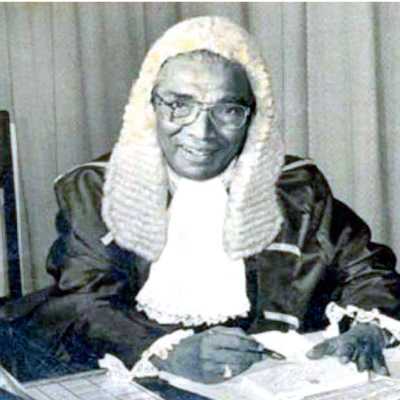Monday Apr 07, 2025
Monday Apr 07, 2025
Thursday, 17 September 2020 00:00 - - {{hitsCtrl.values.hits}}
By Heras Fernando
 The proposed 20th Amendment has ignited many viewpoints in society, at the moment.
The proposed 20th Amendment has ignited many viewpoints in society, at the moment.
In particular, it is said that the proposed 20th Amendment to the Constitution seeks to remove the auditing of accounts pertaining to the office of the President, the first citizen and that of the Prime Minister, the second citizen of the country.
In this backdrop where there is a live debate on the subject of audit of Government accounts, an interesting incident, which I remember well, and pertains to the scope of audit, comes to my mind.
According to the Constitution of the Democratic Socialist Republic of Sri Lanka, the Speaker of Parliament is reckoned to be the third citizen of the country.
On 21 September 1978, Attorney-at-Law M.A. Bakeer Markar, the first Member of Parliament for Beruwala electorate and the Deputy Speaker of Parliament, was appointed as the Speaker of Parliament. It is a well-known fact that he successfully fulfilled the duties and functions attached to the post he held. As the Head of Parliament he organised and managed all administrative activities in an exemplary manner.
At that time, there was no trace of any audit being done on Parliamentary accounts in the history of the Sri Lankan Parliament. As if being inspired by instinct, Speaker Bakeer Markar felt this deficiency, inquired about it from senior Parliamentary officials and was informed that there was no annual audit of Parliamentary accounts being conducted by the Auditor General. Upon further investigation, he saw the importance of auditing all accounts of Parliament and maintaining an annual audit report.
He felt it was a serious misdemeanour not to audit the accounts of Parliament when all the other institutions and departments for which the money is approved by the Parliament undergo an annual audit.
He immediately telephoned the Auditor General and inquired about it. He did not stop at that and summoned the Auditor General to his office. Shortly afterwards, the Auditor General came to the office of the Speaker of Parliament.
Speaker Bakeer Markar welcomed the Auditor General with his usual friendly smile, and said, “You conduct an audit on every institution and department for which Parliament approves money. It is very important. Yet, you don’t audit the accounts of Parliament which approves money for all the other Government institutions. Why? Shouldn’t the accounts of Parliament also be audited?”
The Auditor General replied: “Hon. Speaker, Parliament is a sovereign and independent institution. Therefore, there is no need for us to conduct audits on the accounts of Parliament. Parliament accounts are being audited by the Parliament staff themselves. That is why we have not ventured to conduct an audit of our own on Parliament accounts.”
Markar: “Is there any obstacle or problem that prevents you from commencing this task right now?”
AG: “Hon. Speaker, we can begin the audit today itself, from now onwards. There is no obstacle or problem for that. But to proceed with the task, we need an order, a directive from you at the official level.”
Markar: “Well, I will issue you the order, the directive you asked for, immediately. Conduct a proper audit annually, of the accounts of the Parliament the way you conduct the audit of other Government departments.”
Instantly, the necessary directive was prepared and issued to the Auditor General with his own signature.
This initiative contributed immensely to safeguard the dignity of Parliament, the Speaker himself and the staff of Parliament as well. From that day onwards and to date, all accounts of Parliament of Sri Lanka were audited annually by the Department of the Auditor General.
This is an era when a debate is afloat on apparent removal of the annual audit conducted by the Auditor General of the accounts of the President, the first citizen and that of the Prime Minister, the second citizen of the country by the proposed 20th Amendment to the Constitution.
It is time that Al Haj M.A. Bakeer Markar, Attorney-at-Law, the third citizen of the country and the Speaker of Parliament at the time, who summoned the Auditor General and inquired from him as to why the accounts of the office of the Speaker and the Parliament under his jurisdiction were not being audited and directed the latter to initiate auditing of Parliament accounts and immediately issued necessary instructions and orders to commence the task, should be remembered and emulated.
(The writer is former Deputy Principal, Royal College, Colombo.)
Discover Kapruka, the leading online shopping platform in Sri Lanka, where you can conveniently send Gifts and Flowers to your loved ones for any event including Valentine ’s Day. Explore a wide range of popular Shopping Categories on Kapruka, including Toys, Groceries, Electronics, Birthday Cakes, Fruits, Chocolates, Flower Bouquets, Clothing, Watches, Lingerie, Gift Sets and Jewellery. Also if you’re interested in selling with Kapruka, Partner Central by Kapruka is the best solution to start with. Moreover, through Kapruka Global Shop, you can also enjoy the convenience of purchasing products from renowned platforms like Amazon and eBay and have them delivered to Sri Lanka.
Discover Kapruka, the leading online shopping platform in Sri Lanka, where you can conveniently send Gifts and Flowers to your loved ones for any event including Valentine ’s Day. Explore a wide range of popular Shopping Categories on Kapruka, including Toys, Groceries, Electronics, Birthday Cakes, Fruits, Chocolates, Flower Bouquets, Clothing, Watches, Lingerie, Gift Sets and Jewellery. Also if you’re interested in selling with Kapruka, Partner Central by Kapruka is the best solution to start with. Moreover, through Kapruka Global Shop, you can also enjoy the convenience of purchasing products from renowned platforms like Amazon and eBay and have them delivered to Sri Lanka.